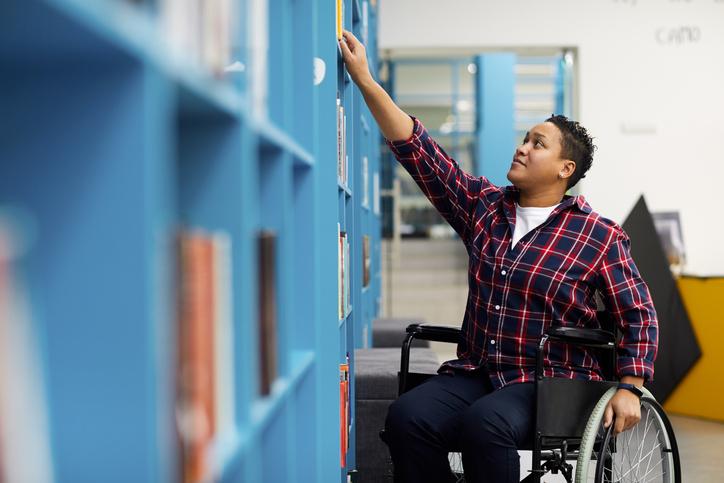
Those of us with dyspraxia are frequently affected by academic ableism
The actions, inertia and discretion of individual academics can be a key driver of ableism – here’s what you and your institution can do to help, says John Macklin

Neurodiversity Celebration Week this month is a chance to celebrate diverse thinkers like me. My specific learning difficulty (SpLD) is dyspraxia, a term I am personally happier with than “neurodiverse”. I am beginning to use the term DCD (development coordination delay) more, but this implies one can catch up. It also ignores emotional impacts and focuses on the physical.
I argue in this piece that academic ableism is not only down to the institution but also the action, inertia and discretion of individuals. It presents mainly in the form of structures and attitudes towards those who, like me, are covered by the Equality Act 2010. To understand ableism, let me outline what it is like as a student and now an academic with an SpLD.
Despite the roles and positions of power being different there is commonality in how this is dealt with in higher education institutions (HEIs), which indicates an oversight at the very least. Indeed, the situation brings to mind David Gillborn’s article on racism in education – he argued that disadvantage is pervasive and partially entitled it “coincidence or conspiracy?”
- What universities can do to support their autistic employees
- 10 ways universities can reject ableism
- A checklist for making disability inclusion a reality in higher education
A common response to my dyspraxia from others is that it is a continuum and we all have some aspects of it. This may well be true, but it hides the everyday emotional and intellectual impact of being “different”. It is not just the fact that some tasks can be more challenging (and some easier) depending upon the individual SpLD, long-term health issue or other form of disability. The problem is that functioning in an ableist institution takes a greater toll on the emotions and intellectual abilities of all of us with disabilities and/or health concerns.
Colleagues inform those of us registered as disabled that there is support for neurodiversity, and HEIs have equality, diversity and inclusion (EDI) statements declaring support. My lived experience has taught me that I can think differently, but just do not express these different thoughts in a meeting or write them in an email. In short, colleagues might understand that we have different thoughts and experiences to share, but in the rush to conformity in thinking, groupthink and getting along they do not want to hear or read that the emperor is naked.
Academics are often attracted to higher education because of the thrill of creating new knowledge in their chosen fields, as Dominic Wyse outlines. But those who think about the world differently consider deeply how and when to express themselves. We frequently hold our own counsel when sometimes the obvious might need highlighting to us. Those of us with SpLDs or disabilities constantly worry about how we are perceived by others when we communicate, and this is something many in marginalised groups have experienced. Such constant navigation is both intellectually and emotionally draining.
Students with SpLDs and disabilities also face difficulties. At my university a front-cover statement highlighting needs is available when submitting work, but for many students these are not iterative and do not reflect changes in circumstances or challenges, or the need to learn new coping mechanisms. They can also make one feel singled out and create a fear of negative pre-judgement.
Then there are issues relating to assessment tasks, class activities and expectations around group work and disability. Yes, some academics are developing new knowledge related to pedagogy, but are the perceived needs of the subject prioritised above the needs of the individual by academics and groups alike?
If one applies Michael Lipsky’s theory of street-level bureaucracy, you can understand how the higher education lecturer can be the ultimate arbiter of students’ experiences rather than the institution. Lipsky states that “the actions of most public service workers actually constitute the services ‘delivered’ by government” – that front-line staff often become de facto decision-makers.
And research and subject usually come first in academia. This choice is frequently made without considering students’ needs, with the choices individuals make to preference the organisation or colleagues distorting what students experience. We can and should find a balance for subject, colleagues, institutions and students.
So what can be done? For a start, understand the various disabilities in the workplace and know the needs of your students and staff. We should develop mechanisms to support students through disability teams that are well funded. For staff, there must be easy access to high-quality occupational health assessments. These are minimum requirements.
For many of us with SpLDs, cognitive load is ever-present because of reduced working memory (it is in my case), which mostly affects how I structure written work and schedule activities. Being open to these challenges and providing additional time for some (negotiated) tasks can help, as can aligning work patterns and priorities with needs and skills, and providing tailored development opportunities rather than a one-size-fits-all approach. These adjustments would benefit everyone and avoid creating a two-tier system.
At the University of East London, where I work, when it comes to supporting staff to help students I work closely with a director of education and experience, as well as the dean of the school. We have brought together the disparate teams within the university that support students, including the 18 per cent registered with the disability unit, by implementing a diagnostic test for all new students. This is a key “triage” point for directing students to further support and has flagged up a greater number of well-being issues post-pandemic.
We also have a termly “360 caseload” meeting involving tutors, the disability team, the well-being team and student services, where added support available for students is discussed to ensure help is sufficient for the needs. We also guide students to disability assessments, writing support and/or conversations with academic advisers.
There is also a move towards authentic assessment – a discussion accelerated by the need to protect student welfare – and a programme of recovery sessions for students who have failed. The final piece of the jigsaw is the existence of a Senco (special educational needs coordinator) with two deputies to oversee our processes and support and develop colleagues to better support students.
John Macklin is a middle leader at the University of East London’s School of Education and Communities. He is a qualified leadership coach and a trustee of the Dyspraxia Foundation who was assessed with dyspraxia in 2014. He is a very reluctant writer but very keen speaker and presenter.
If youwould like advice and insight from academics and university staff delivered direct to your inbox each week, sign up for the Campus newsletter.


